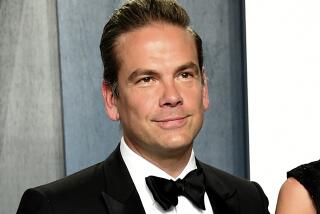Likely New CEO a Steady Leader
PARIS — In the aftermath of Jean-Marie Messier’s traumatic fall, crisis-torn media conglomerate Vivendi Universal desperately needs “an anti-Messier,” a low-key, steady leader who must be especially adept at balancing French and U.S. interests, analysts say.
The board of directors apparently believes that Jean-Rene Fourtou, a veteran consultant and pharmaceutical executive considered the likely successor to the brash Messier, is the man for these troubled times. It is expected to name Fourtou interim chief at a high-stakes meeting today, although other candidates still were being mentioned Tuesday.
Whoever assumes the new role of CEO probably will begin efforts to turn around the ailing company by selling key assets of French-U.S. conglomerate. And therein lies inherent conflict: Whereas U.S. investors will want to see quick and profitable sales of assets, the French have a different agenda, analysts say.
French allies here will expect the new leader to protect French firms whose loss to foreign buyers would be a political debacle, especially the Canal Plus cable television channel and Vivendi Environnement, which supplies water to about 40% of the municipalities in the country, said Elie Cohn, research director of the National Academic Research Center, a Paris think tank.
Daniel Fortin, editor of the Challenges economics journal here and author of a book about Messier, agreed: “The American reading of things will be ... Let’s sell as quickly as possible the assets that are easiest to sell, in order to get the group out of debt and refocus on films and music. The French reading will be much more patriotic when it comes to saving what can be saved of Vivendi, notably its French aspects.
“In reality, Messier’s successor, whoever he is, will have to achieve a synthesis between these very, very different visions,” Fortin added.
Fourtou has solid credentials and connections in the select milieu in which the elite of France’s private and public sectors converge. He’s an old friend of former French President Valery Giscard d’Estaing and other influential figures who helped hasten Messier’s departure.
He has experience navigating change and has demonstrated an ability to work on both sides of the Atlantic and oversee corporate restructuring projects. A business consultant for 23 years, Fourtou oversaw the privatization of a French pharmaceutical company and its eventual fusion with German interests to create Aventis, one of the world’s largest pharmaceutical concerns. He’s done plenty of business in the United States.
Moreover, the 63-year-old Fourtou, who now is semi-retired as vice chairman of Aventis’ board, doesn’t have much to lose as he confronts the massive job of resuscitating the world’s second-biggest media company.
“You have to realize that there aren’t a lot of candidates to take over a group like this in the state that it’s in,” said Fortin. “You need a man whose career is largely behind him.”
In addition to Giscard and players in the center-right government of President Jacques Chirac who believed change at the top was overdue, the choice of Fourtou was championed by Claude Bebear, a powerhouse among French executives and a vocal critic of Messier, according to analysts and news reports.
Bebear, former CEO of AXA, has been friends with Fourtou for 30 years. Both are children of teachers, and both are from southwest France and are avid athletes and lovers of good food.
Fourtou studied at the prestigious Ecole Polytechnique. He joined Bossard Consultants in 1963, eventually rising to the top post at the consulting firm. The Giscard government put him in charge of the state pharmaceutical company, Rhone-Poulenc, in 1986. He oversaw the 1993 privatization and restructuring of the firm, which merged with Hoechst of Germany six years later to form Aventis.
Fourtou’s “discreet, self-effacing” personality will come in handy, Cohn said. Messier’s combative style became one of the fundamental elements contributing to the uproar at Vivendi, he said. Nonetheless, some analysts say they aren’t sure Fourtou is up to the job.
“It’s a choice that surprises me,” Fortin said. “He’s never been one of the most prestigious executives in France.”
Whether it turns out to be Fourtou or a surprise alternative, Messier’s successor will have to move fast. After months of losses, surging debt and headlong expenditures, the mood is grim at Vivendi.
Union leaders and employees fear that working people could be hit hardest.
The most urgent issue: assessing and clarifying a murky financial picture.
“No one knows exactly the magnitude of the risk at Vivendi,” Cohn said. The successor “arrives in a situation of extreme crisis, and there is no time to lose. He will have to use all his contacts and negotiating skills.”
Times staff writer Rotella reported from Lyon, France, and special correspondent White from Paris. Achrene Sicakyuz of The Times’ Paris Bureau also contributed to this report.
More to Read
Inside the business of entertainment
The Wide Shot brings you news, analysis and insights on everything from streaming wars to production — and what it all means for the future.
You may occasionally receive promotional content from the Los Angeles Times.










